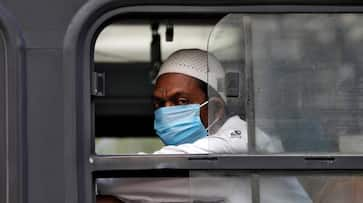A Srinagar-based businessman travelled by air, train and road to Delhi, Uttar Pradesh and back to Jammu and Kashmir before he died of COVID-19, and may have infected many others, including a doctor battling for life in a Jammu hospital, officials said on Tuesday.
Bengaluru: A Srinagar-based businessman travelled by air, train and road to Delhi, Uttar Pradesh and back to Jammu and Kashmir before he died of COVID-19, and may have infected many others, including a doctor battling for life in a Jammu hospital, officials said on Tuesday.
The businessman, who travelled to Delhi to attend a Tablighi Jamaat congregation, died on March 26 in a Srinagar hospital, 19 days after he set off for the national capital.
He could have infected scores of people during his travels and about 300 people have been put under quarantine because of him, officials said.
Recapping his movements, they said he left by air from Srinagar to Delhi on March 7 to attend the congregation of the Tablighi Jamaat, an orthodox Muslim organisation at the centre of the coronavirus spread with 24 of the 2,000 odd participants testing positive.
Six people in Telangana who attended the meeting in the city's Nizamuddin West area died on Monday.
Being referred to as a "super spreader" by some, officials said the Kashmiri businessman left Delhi on March 9 and took a sleeper coach of a train for Deoband, where he attended a meeting at the Darul Uloom seminary. Two days later, on March 11, he took another train to Jammu.
Tracking the travel history of the man, who was in his mid-60s, officials said many of the passengers travelling with him in the trains have been put under quarantine after authorities dug out their details.
In Jammu, the businessman met up with his doctor friend and both addressed a religious congregation in a mosque in Samba on the outskirts of the city.
The two were together till March 16 and stayed at a lodge, since sealed, in Bari Bramhmana outside Jammu city.
The doctor, now in a Jammu hospital in a critical condition, belongs to Rajouri district of Jammu region, officials said. At least 45 people from his area have been quarantined.
On March 16, the businessman, little suspecting that he might be a full blown case of COVID-19 and a carrier of the virus, took a flight to Srinagar from where he drove to Sopore in north Kashmir, about 54 km away. Two days later, he returned to his home in Srinagar, again by road.
"He complained of chest pain and normal flu on March 21 and was taken to a nearby hospital and later to the super specialty SKIMS hospital in Soura on the outskirts of Srinagar," an official said.
Doctors were initially of the opinion that he had a pollen allergy, common in Kashmir during spring. The next day, however, his condition deteriorated and he was shifted to the Chest and Disease Hospital in the city where he died on March 26.
The elderly gentleman was the first coronavirus fatality in Jammu and Kashmir, which has reported 55 cases.
As news spread about the death, officials began tracking his movements closely. He is believed to have spread the virus to at least four people from Bandipora district who had attended his Sopore congregation and maybe more as well.
The passenger lists of the flights on which he travelled were also pulled out and every individual was picked up and put under necessary quarantine, they said, adding the two doctors who had examined him were also taken for quarantine.
Authorities across the country have swung into action to trace the contacts of those who attended the Tablighi Jamaat congregation, attended by hundreds of people, including from Malaysia, Saudi Arabia and Indonesia.
Delhi Health Minister Satyendar Jain said 1,033 people in Nizamuddin West have been shifted to various places.
"An estimated 700 people who attended this congregation have been quarantined while around 335 people have been admitted to hospitals," he told reporters.
Besides, all those who participated in the event are being screened.
Members of the Tablighi Jamaat are known to travel in the cheapest modes of transport so they can reach out to more people.
They also hold religious 'Iztimas' (congregations) locally besides giving sermons at mosques.
Last Updated Mar 31, 2020, 5:05 PM IST









![Salman Khan sets stage on fire for Anant Ambani, Radhika Merchant pre-wedding festivities [WATCH] ATG](https://static-gi.asianetnews.com/images/01hr1hh8y86gvb4kbqgnyhc0w0/whatsapp-image-2024-03-03-at-12-24-37-pm_100x60xt.jpg)
![Pregnant Deepika Padukone dances with Ranveer Singh at Anant Ambani, Radhika Merchant pre-wedding bash [WATCH] ATG](https://static-gi.asianetnews.com/images/01hr1ffyd3nzqzgm6ba0k87vr8/whatsapp-image-2024-03-03-at-11-45-35-am_100x60xt.jpg)


